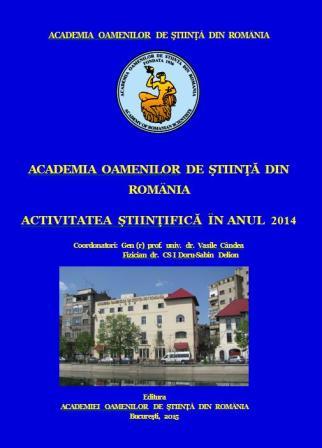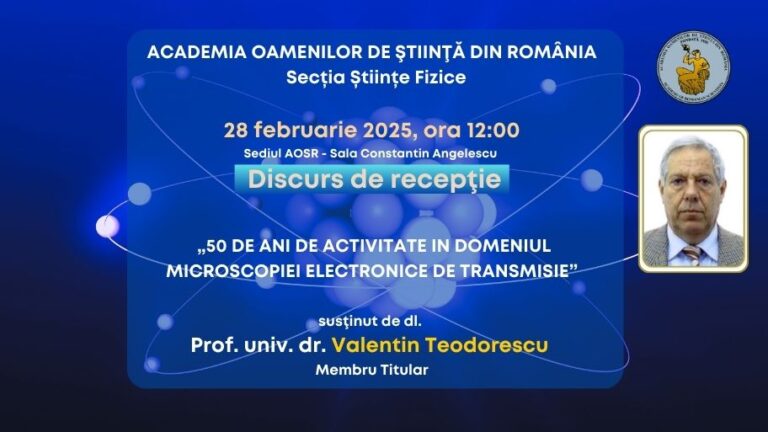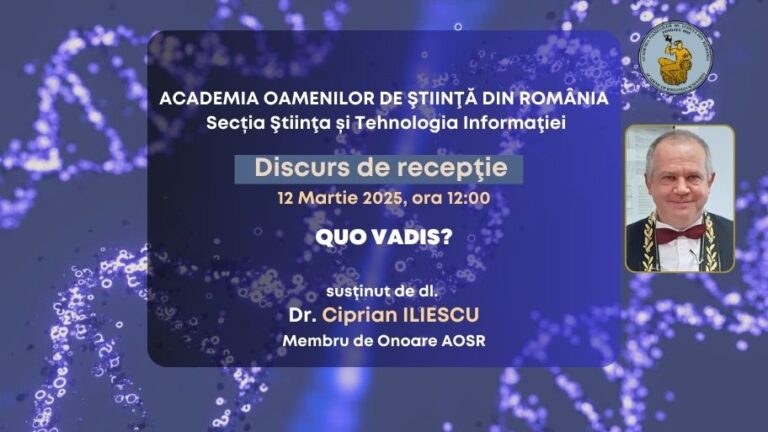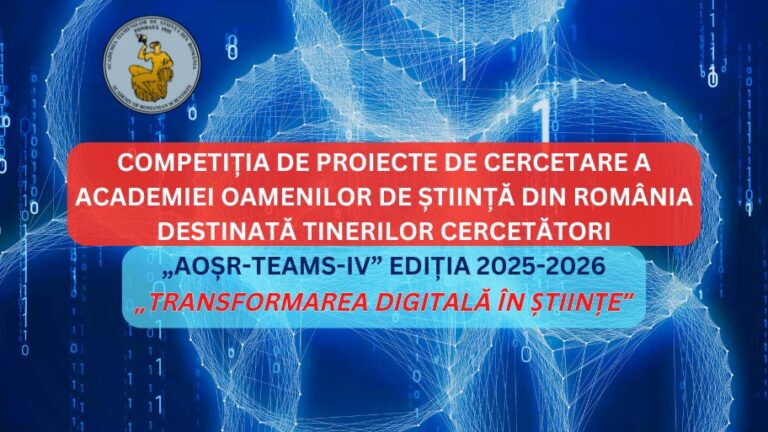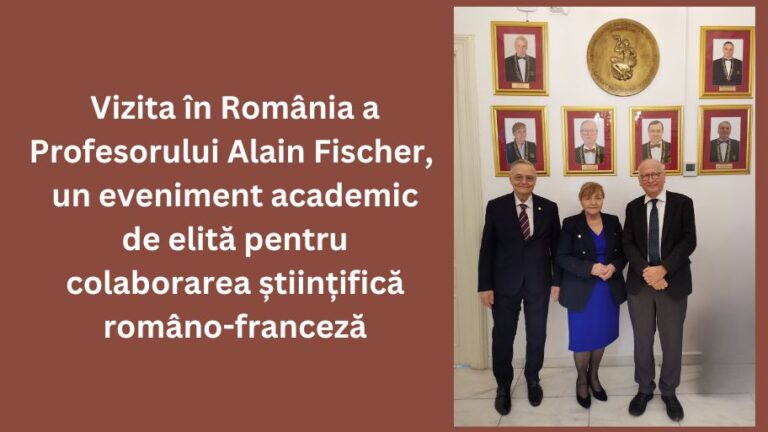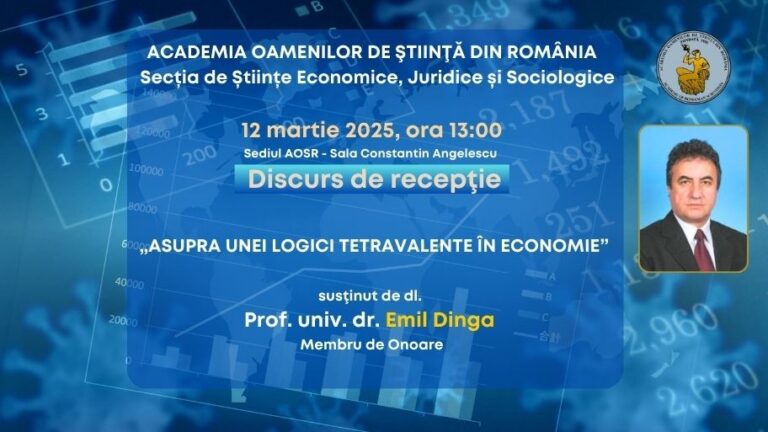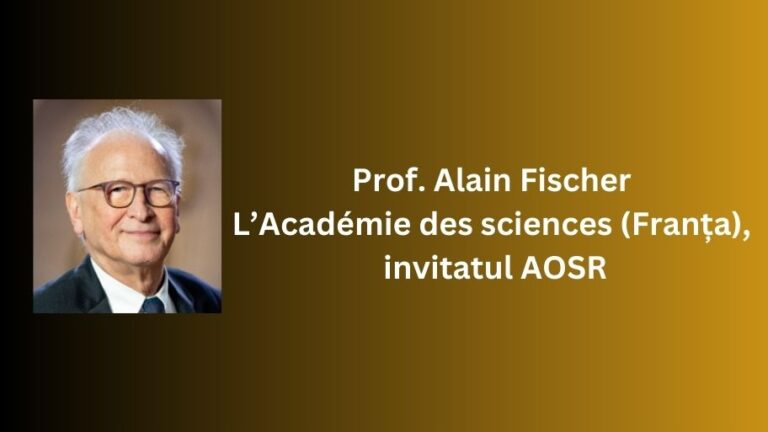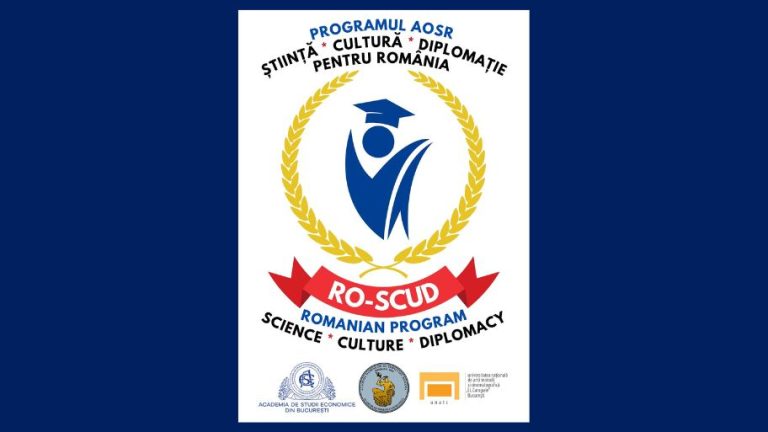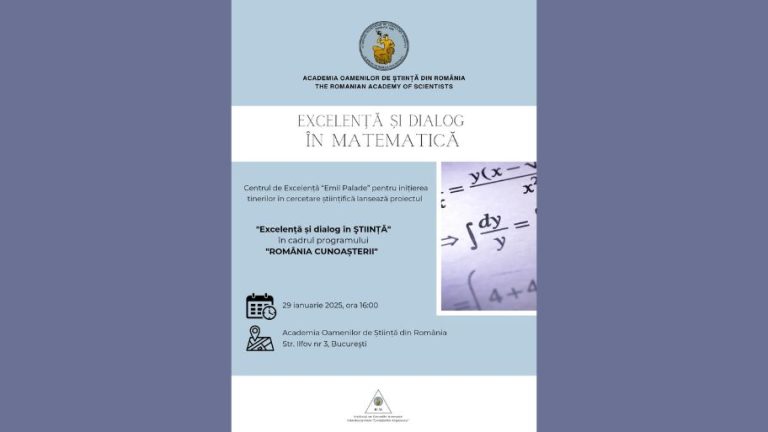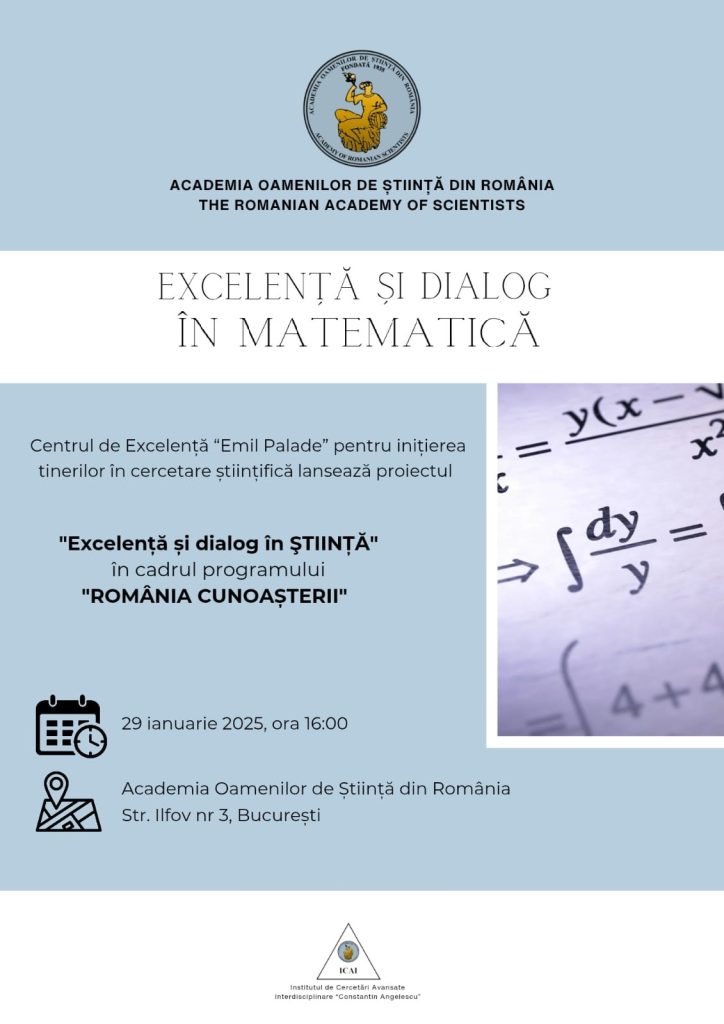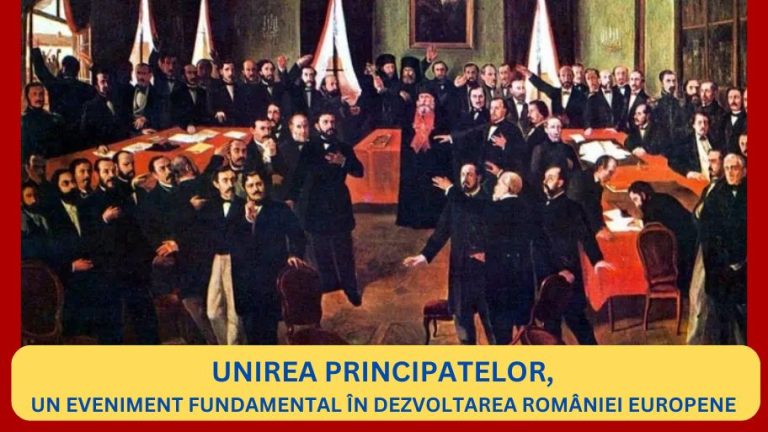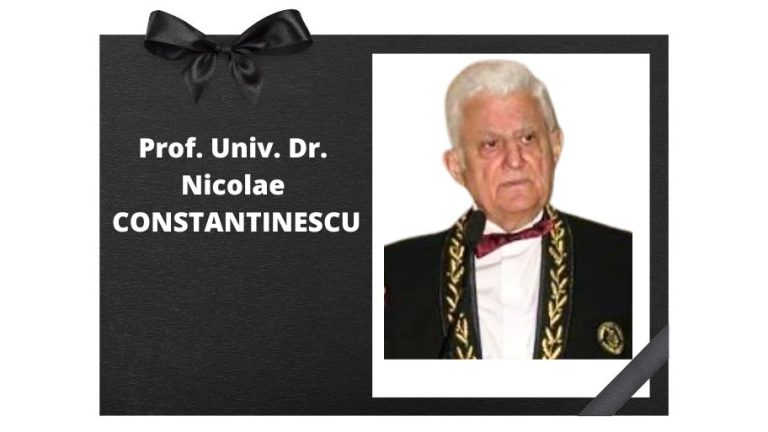Welcome to WordPress. This is your first post. Edit or delete it, then start blogging!
Welcoming speech – Prof. univ.dr. Valentin Teodorescu
Friday, February 28, 2025, 12.00, at the AOSR headquarters will take place the reception speech by Prof. Valentin Teodorescu, with the theme 50 years of activity in the field of transmission electron microscopy.
The presentation intends to highlight two aspects of the work carried out in the field of transmission electron microscopy. The first is to highlight the main themes concerning the structure of the materials studied by the author, using conventional and high-resolution transmission electron microscopy. Secondly, the working methods and analysis methods, which allow the interpretation of TEM observations, are concretely presented.
Reception speech Dr. Ciprian Iliescu, Honorary Member AOSR
ACADEMY OF ROMANIAN SCIENTISTS
– Information Science and Technology Section-
On March 12, 2025, at 12:00, in the Dr. Constantin Angelescu Hall of the AOSR, the Reception Speech – QUO VADIS ?– delivered by Dr. Ciprian ILIESCU, Honorary Member
RESEARCH PROJECTS COMPETITION OF THE ACADEMY OF SCIENTISTS OF ROMANIA FOR YOUNG RESEARCHERS “AOȘR-TEAMS-IV” EDITION 2025-2026 “DIGITAL TRANSFORMATION IN SCIENCE”
===== INFORMATION PACK =====
I. PURPOSE OF THE COMPETITION
The competition encourages young people to get involved in research in topical areas of science and technology.
The main objective is to increase the international scientific visibility of young researchers by stimulating the publication of original scientific results in journals of wide international circulation, with significant impact factors, as well as the filing of patents to prove the associated technological procedures.
The competition also aims to establish scientific collaboration between young researchers and members of the Romanian Academy of Scientists (AOȘR).
II. COMPOSITION OF THE RESEARCH TEAM
The research team is composed of academics, research scientists or research assistants, doctoral or master’s students, aged 35 years or less. The team leader, having a doctoral degree, may be up to 40 years old. Ages must be reached after 01.04.2025. The team includes the Director and at least one member.
Research team members can only apply to one project. Members of winning and funded teams from the previous AOȘR-TEAMS-III 2024-2025 competition are not eligible to submit projects.
Each approved paper will be monitored by an AOSR member.
III. PROJECT DURATION AND CONTRACTING
The duration of the project is a maximum of 20 months from the date of signature of the contract. The contract will be made on the basis of copyright assignment to the AOȘR. Project members will mention on the articles published based on the results obtained and the additional affiliation:
“Academy of Romanian Scientists, Ilfov 3, 050044 Bucharest, Romania”
IV. PROJECT BUDGET
The budget allocated to a project is a maximum of 50 000 lei, spread over two years.
V. STRUCTURE OF THE PROJECT PROPOSAL
The project proposal will have the following structure, divided into two files:
BeșThe V.A
A.1. Project Manager
Signed Curriculum Vitae (max. 3 pages), indicating previous research projects
Contact email address and phone number
Link to personal page (optional)
Link to the Google Scholar papers/citations page https://scholar.google.ro/citations
A.2. Research team
List containing, for each participant:
Full name, Date of birth, Professional position, Place of employment.
For master and doctoral students, please indicate the institution where they work.
Link to personal page or Curriculum Vitae, Link to Google Scholar papers/credentials page.
VB file
B.1. Project proposal (max. 10 pages in Romanian)
1. Title, indicating one scientific field from the list of 12 fields in Section VI
2. Keywords
3. Objectives, indicating their importance
4. Methodology, indicating the degree of originality
5. Estimated intermediate/final results with indication of timetable of activities
6. Articles estimated to be developed, indicating the estimated impact factor of the journal where they will be submitted for publication. Possible patent proposals
7. Bibliography
8. Amount requested (do not specify types of expenditure).
B.2. Title and summary in English (max. 10 lines)
VI. SCIENTIFIC AREAS PROPOSED FOR COMPETITION
The research topics will be oriented towards the use of IT&C in addressing the themes of the AOSR projects – Romania of Knowledge and RO-SCUD.
- ROMANIA OF KNOWLEDGE
1. Education, Research, Innovation;
2. Communications, Information Technology and Artificial Intelligence;
3. Efficient and Sustainable Development; Reindustrialization;
4. Efficient and Organic Agriculture;
5. Health;
6. Culture, civilization, spirituality;
7. Energy and mineral resources;
8. Human Resources; Social Policies;
9. Ecology, Environment, Climate Change;
10. Defence, public order and national security.
- RO-SCUD
The projects submitted for the RO-SCUD (Science, Culture, Diplomacy) program will be oriented towards the objectives of the program specified HERE
VII. EVALUATION PROCESS
The projects will be evaluated by teams of 2 evaluators from home or abroad. The evaluators will be selected among AOȘR members, members of other academies, academics, researchers from home and abroad, with recognized scientific merit. Evaluators and their relatives cannot have projects in competition. Evaluators are selected and validated by the Scientific Council of AOȘR
The project proposal can accumulate after evaluation max. 100 points.
If the individual evaluations of a project differ by more than 15 points, the project will be re-evaluated in a panel with the participation of the evaluators and a member of the AOSR Scientific Council, appointed by the AOSR President. The final score will be determined after the panel discussion.
The total number of projects accepted will be within the competition budget. For one area 1-3 projects will be accepted for funding in order to cover all areas of the competition.
Evaluation criteria
A.1. The director’s experience in the field, established on the basis of the projects led or in which he/she has participated and international scientific visibility, as demonstrated by the papers published in the field and their citations (max. 20 points)
A.1. Scientific visibility of team members (max. 10 points)
B.1. Fulfillment of the research areas set for the competition (eliminatory)
B.2. Timeliness and importance of the project theme (max. 15 points)
B.3. Clear definition of research objectives, methodology and plan of activities leading to their achievement (max. 30 points)
B.4. Originality of proposed solutions (max. 20 points)
B.5. Staging of research activities (max. 5 points)
Proposal disqualification criteria
C.1. Non-compliance with the scientific fields of Section VI
C.2. Failure to meet the age criteria
C.3. Project proposals containing at least one joint participant
C.4. Proposals for projects that have been financed from other funds.
VIII. SUBMISSION OF THE PROJECT PROPOSAL
The V.A file signed by the project director and the V.B file, both in pdf format, should be sent by email to: secretariat.aosr@gmail.com or secretariat@aosr.ro.
Receipt of projects will be confirmed by an entry number sent to the sender’s e-mail address. Any objections as well as questions related to the competition can be sent to the above addresses.
IX. COMPETITION CALENDAR
2025
15.02 – Publication of the competition on the institution’s website www.aosr.ro
15.02-15.03 – Submission of project proposals, at 16:00
16.03-23.03 – Analysis of proposals and publication of competition results
24-27.03 – Submission of applications
27-30.03 – Analysis of applications and publication of final results
31.03 – 4.04 – Contracting of projects accepted for funding
2026
01.01-30.11 – Research work
01-10.12 – Evaluation of final research reports and papers/papers submitted for publication.
X. FINAL CLARIFICATIONS
In order to be funded on a rhythmic basis, signed interim reports in pdf format (max. 10 pages) will be emailed to
July 31, December 5, 2025,
June 30, 2026 and the final report on December 4, 2026
on the basis of which the acceptance committee decides the payment of the respective phases. Milestone results will be reported at conferences organized before the reporting dates. The results of all projects will be published on the AOSR website.
Payments will be made in four instalments and the Project Manager will report on how the money will be spent.
The December reports for each year will contain manuscripts of papers submitted for publication and editorial acknowledgements of receipt, as well as patent proposals.
The final report will mention at least three papers based on the results of the project published in Web of Science journals with mention of affiliation to AOȘR.
PRESIDENT OF THE AOSR
Prof. univ. dr. eng. DOINA BANCIU
Prof. Alain Fischer’s visit to Romania opens prospects for collaboration between L’Académie des Sciences and the Romanian Academy of Scientists
On February 10-14, the visit to Romania of Professor Dr. Alain Fischer, member of the board of the French Academy of Sciences and its President until 2025, took place. The visit to Romania of the distinguished academic and medical scientist was organized by Romanian Academy of Scientistswith the support of the French Embassy.
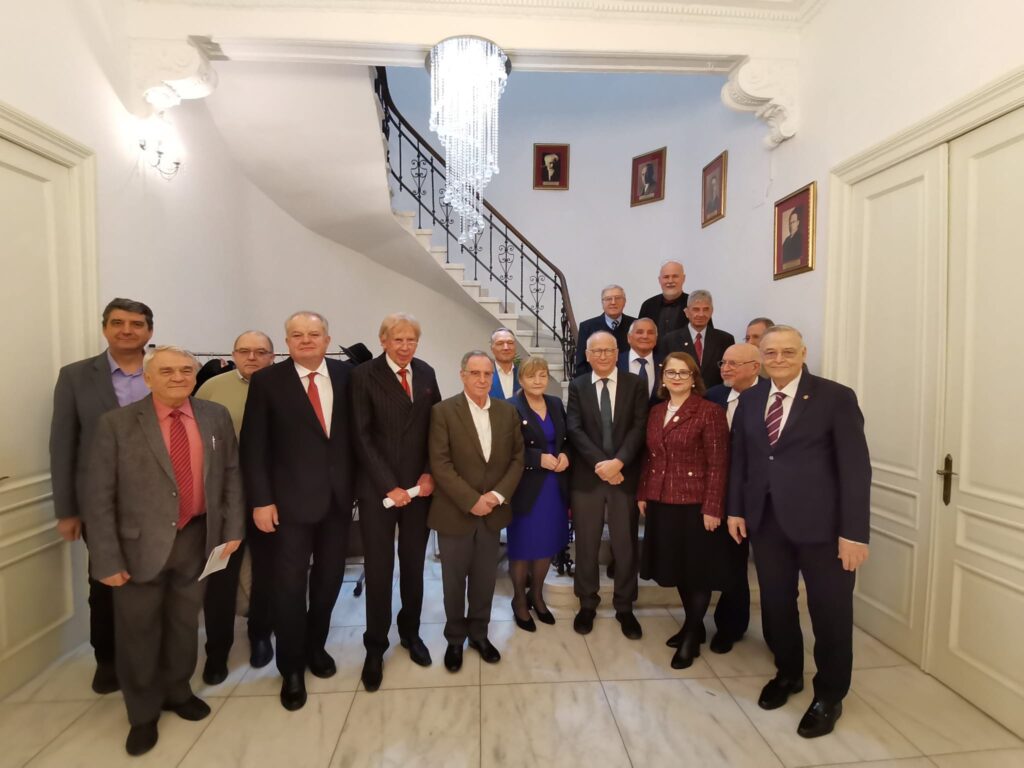
Professor Alain Fischer is a prestigious personality of science, physician, professor of pediatric immunology, researcher in medical sciences and gene therapy, academician. Professor Alain Fischer is one of the most renowned scientists in the field of immunology and genetic medicine, widely recognized internationally, with a series of fundamental, pioneering contributions that have revolutionized the treatment of immunodeficiency diseases. He is Professor Emeritus at the Collège de France, the world’s benchmark of scientific excellence, where he chaired the Department of Experimental Medicine. Through his lifetime of scientific and scholarly excellence, Professor and Academician Alain Fischer is an illustrious figure in the medical sciences, an elite personality who has contributed to the advancement of scientific research in the field of immunology.
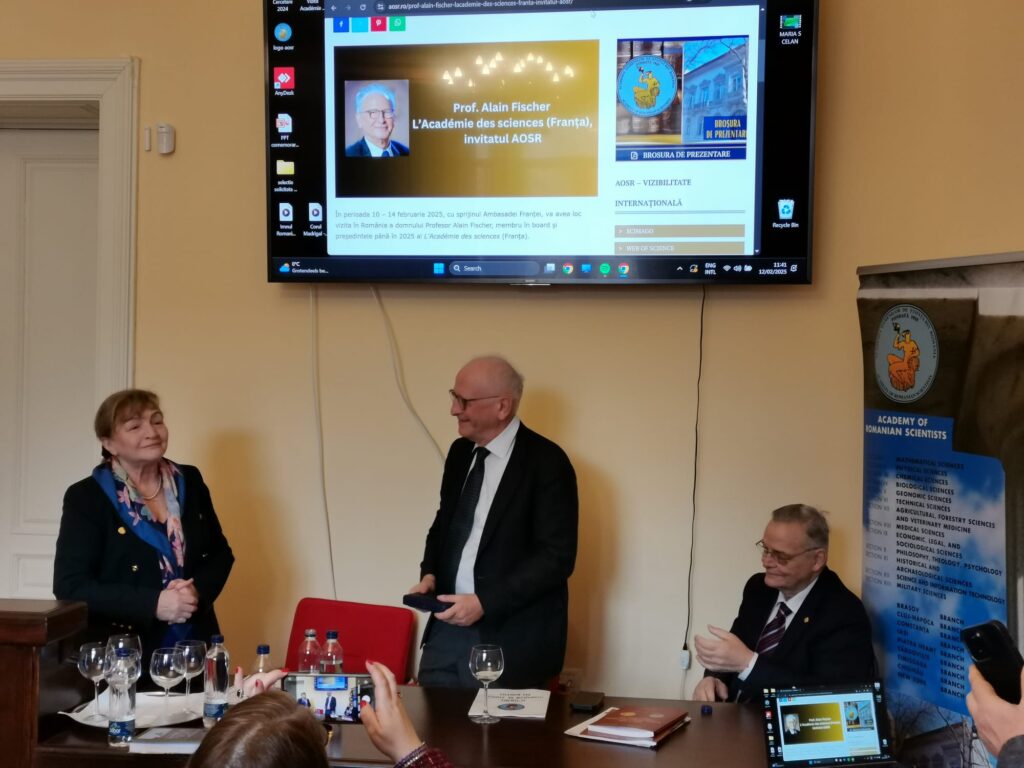
Professor Alain Fischer’s program in Romania, organized by the Romanian Academy of Scientists, included a series of visits to emblematic academic institutions, meetings and discussions on scientific topics and projects.
On February 10, in Cluj-Napoca, Professor Alain Fischer met with Mr. Marius Bojiță, President of the AOSR Cluj Branch, with members of the branch, with Prof. Dr. Anca Dana Buzoianu, Rector of the University of Medicine and Pharmacy “Iuliu Hațieganu” of Cluj-Napoca and with representatives of the University. Starting at 16.00, the French scientist gave a lecture on “Medical progress and its political and economic limits” in the Multimedia Room of the UMF, which was attended by a select audience.
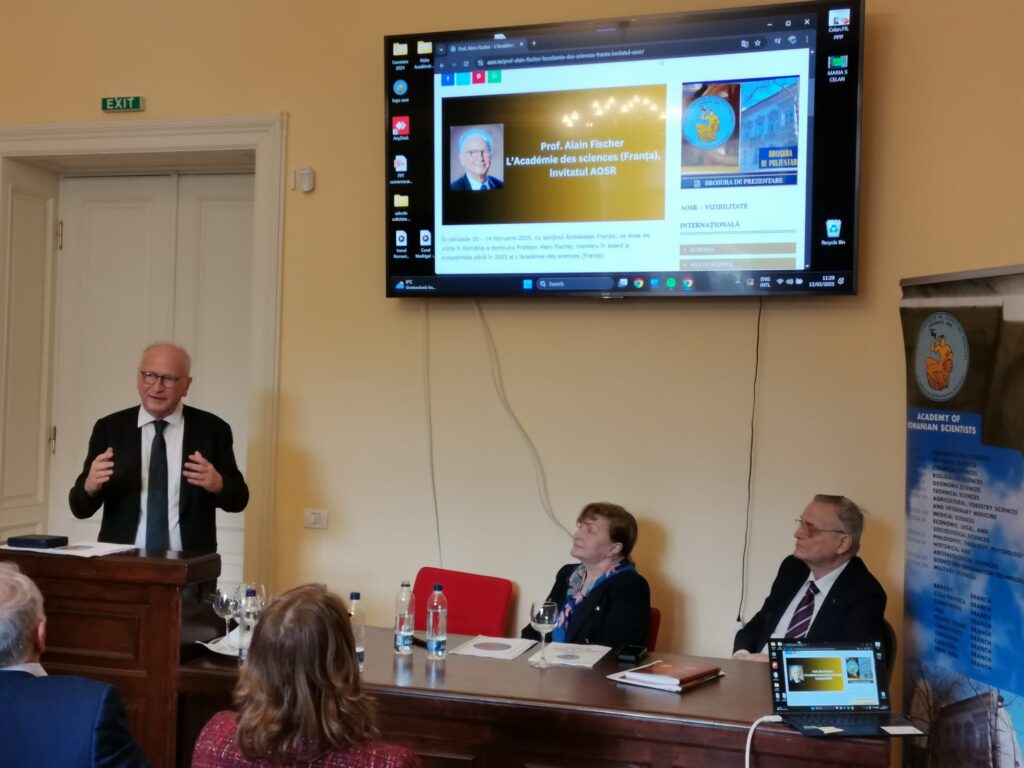
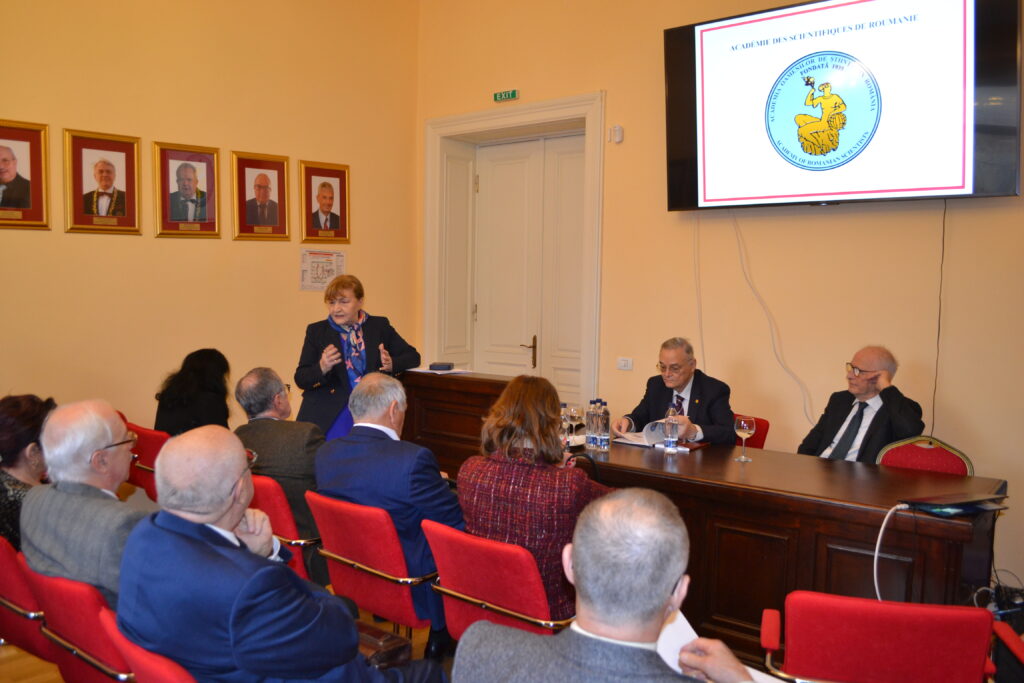
On Tuesday, February 11, Prof. Alain Fischer visited the Romanian Academy of Scientists, where he met with the leadership of the institution and the presidents of the sections and branches of the Romanian Academy of Scientists. The meeting was moderated by Prof. dr. Eng. Doina Banciu, President of the Romanian Academy of Scientists, who presented the institution, its activity, programs and projects. She referred to two major programs of the AOSR: the Romania Knowledge Program and the RO-SCUD Program, dedicated to sustainable development through science, research and knowledge. In this context, Prof. Doina Banciu emphasized the desire for collaboration between the Romanian Academy of Scientists and the French Academy of Sciences, represented by Professor Alain Fischer, and the opportunity created in this respect.
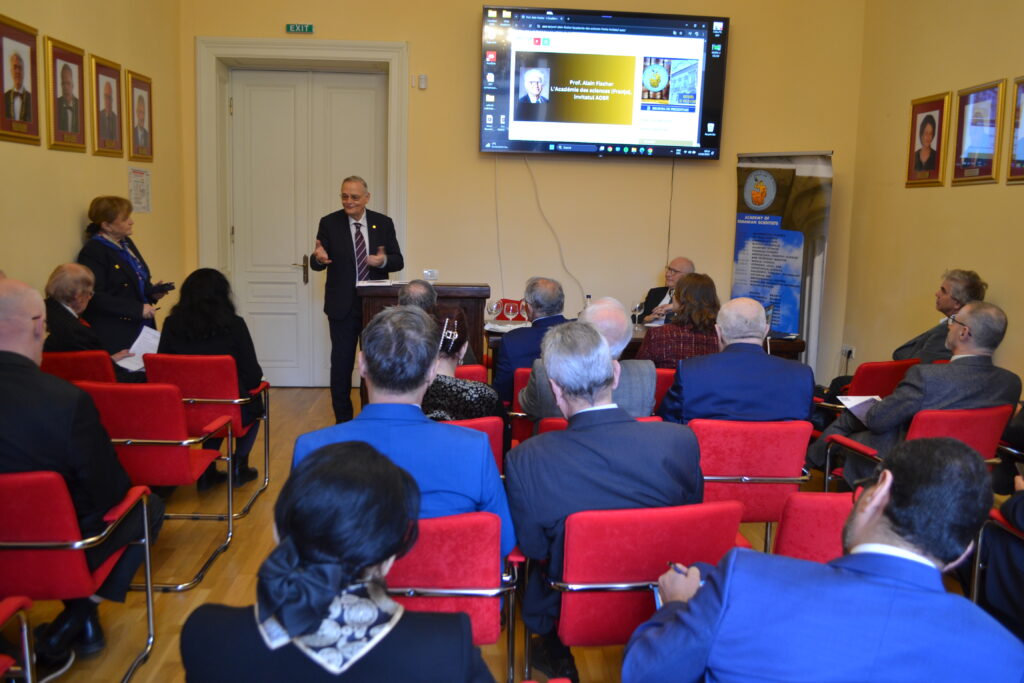
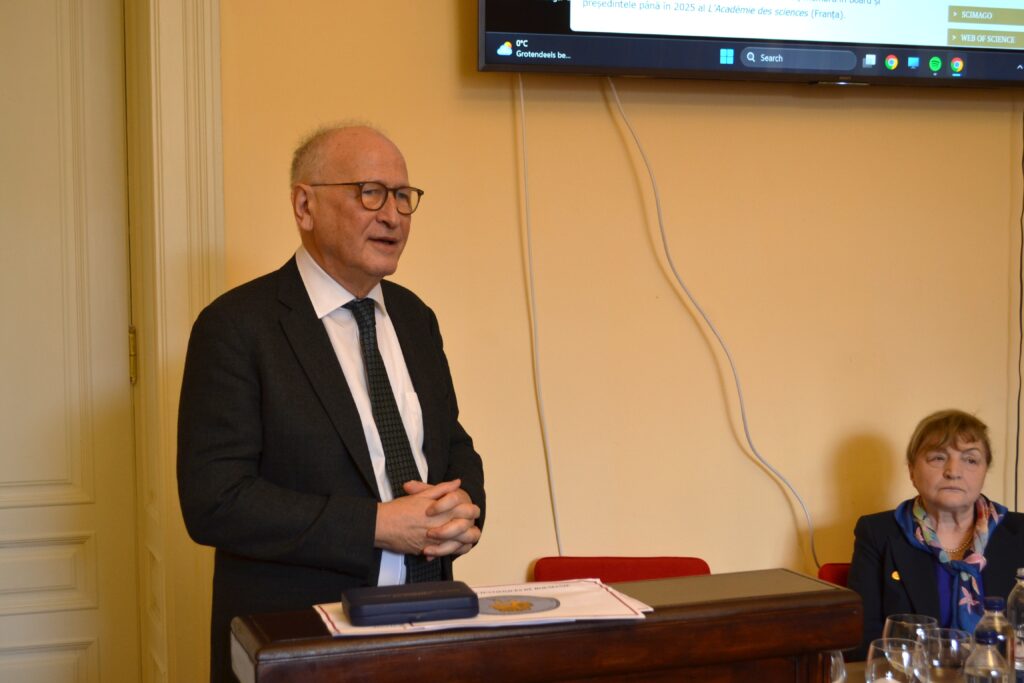
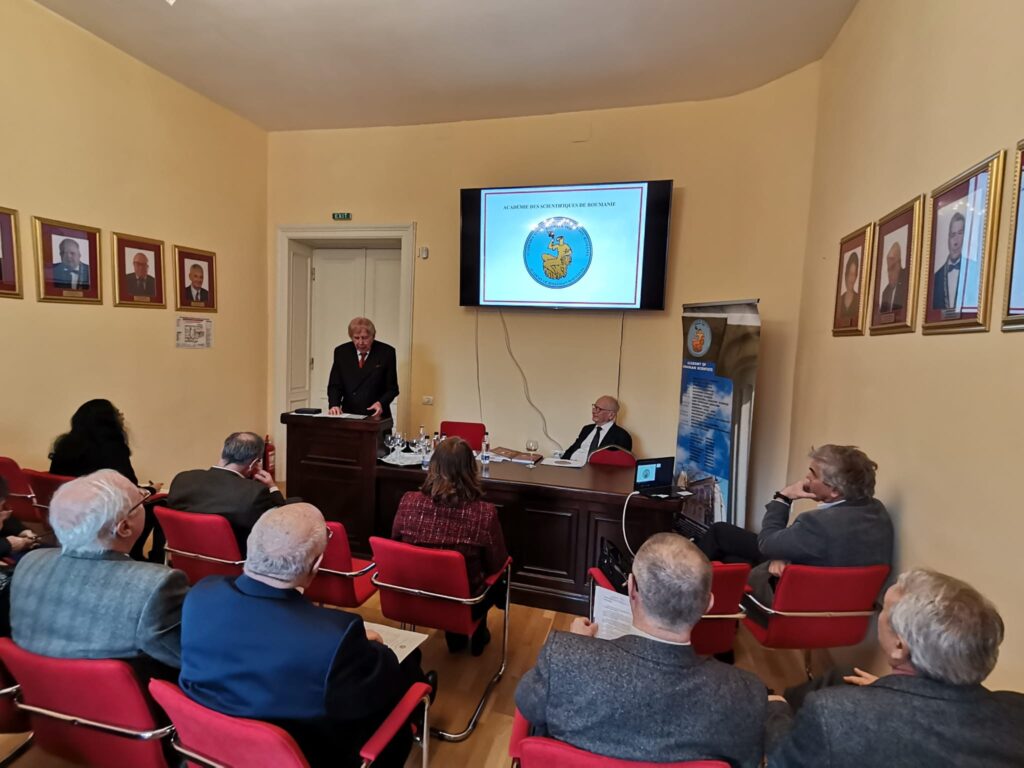
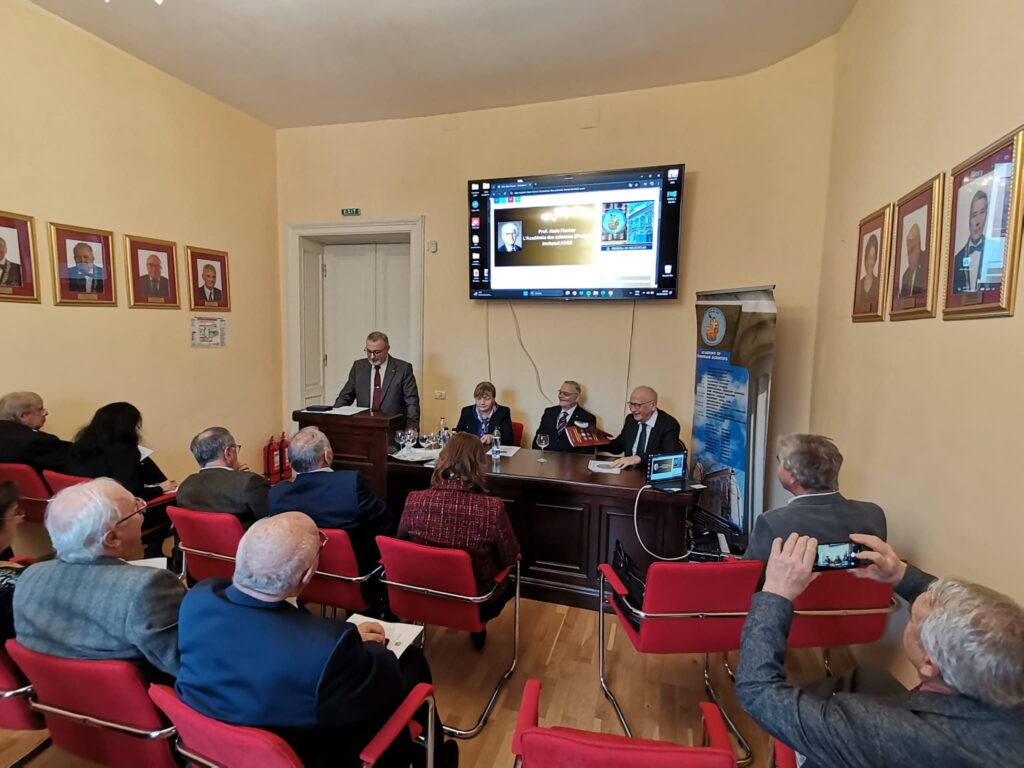
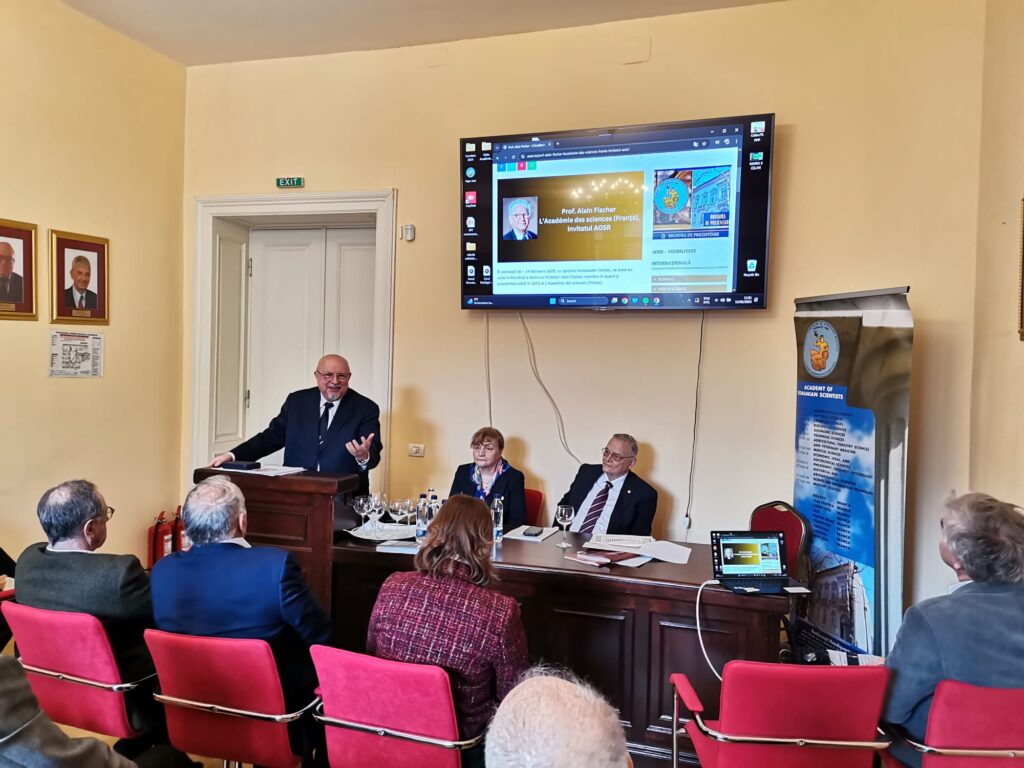
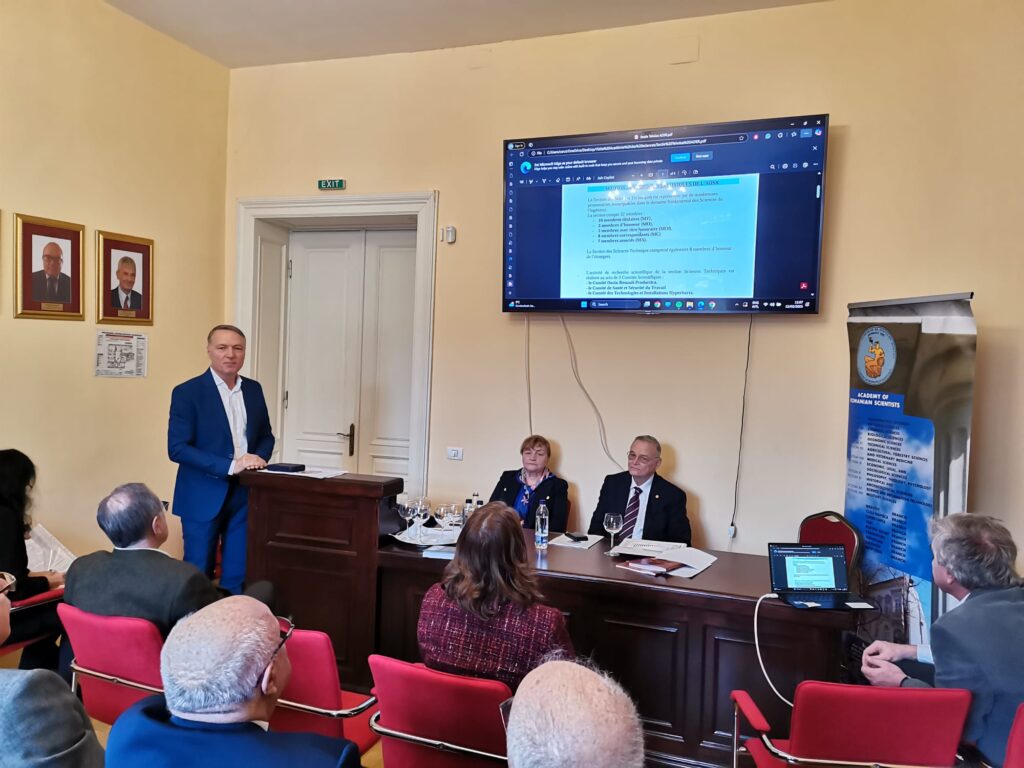
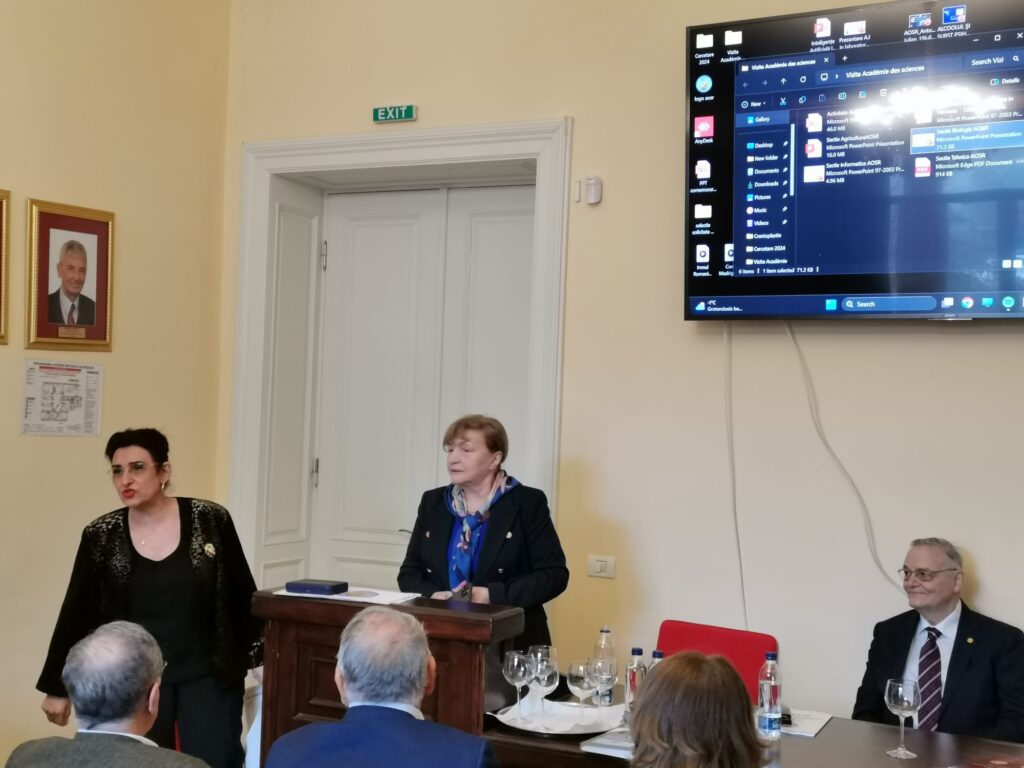
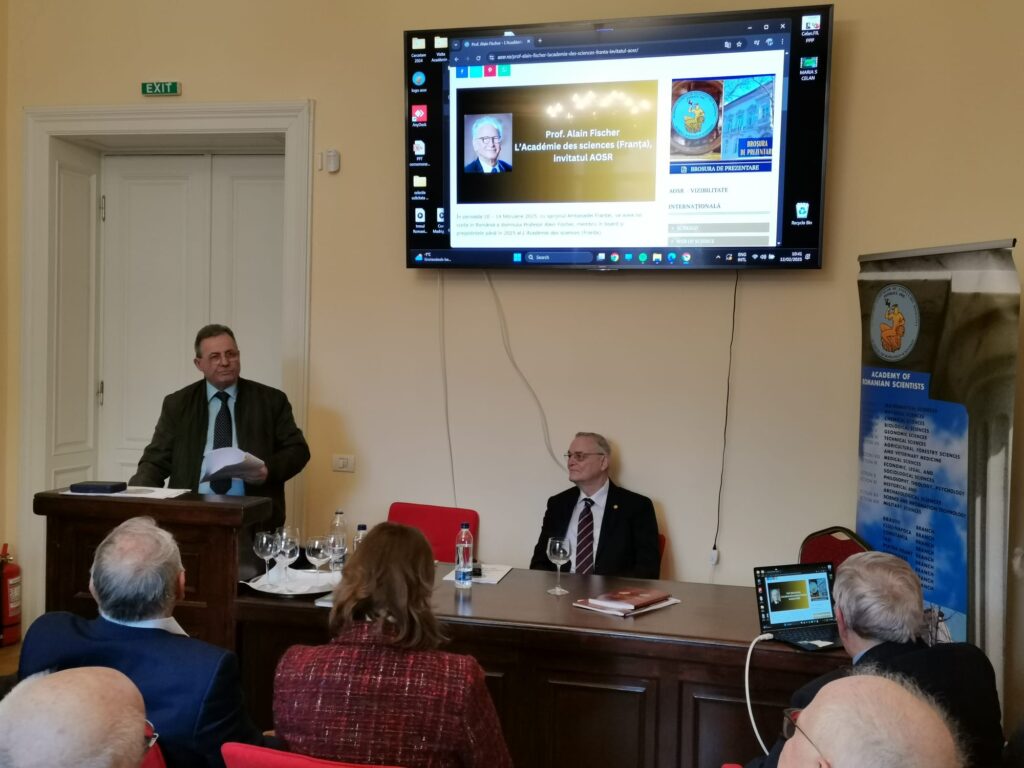
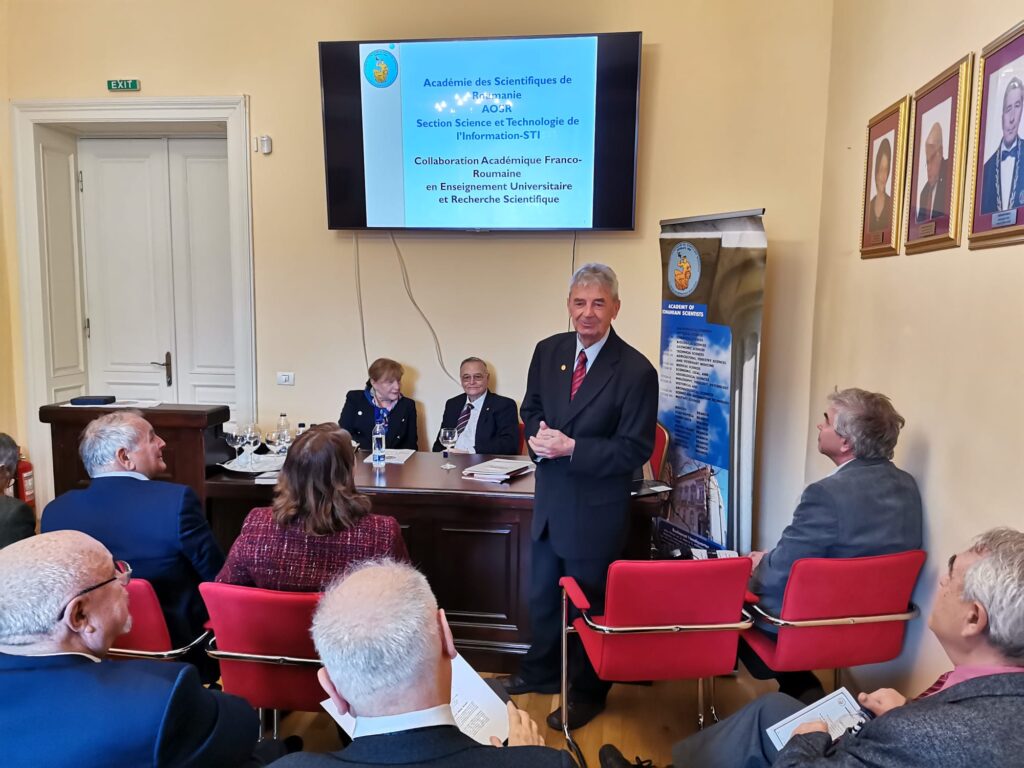
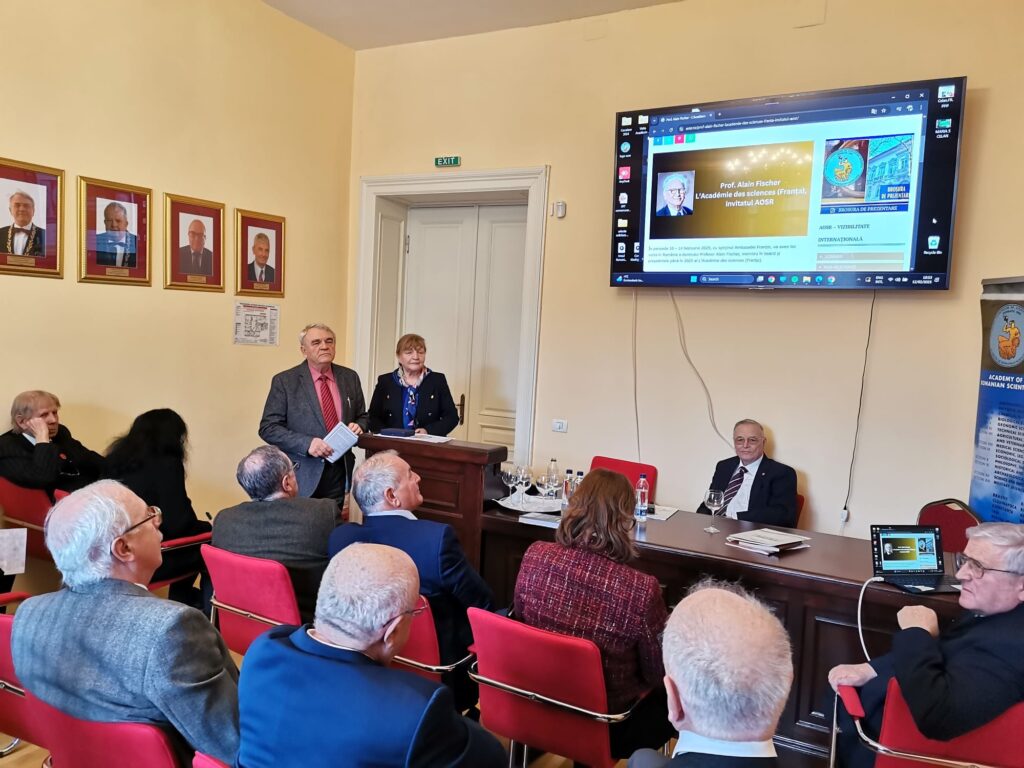
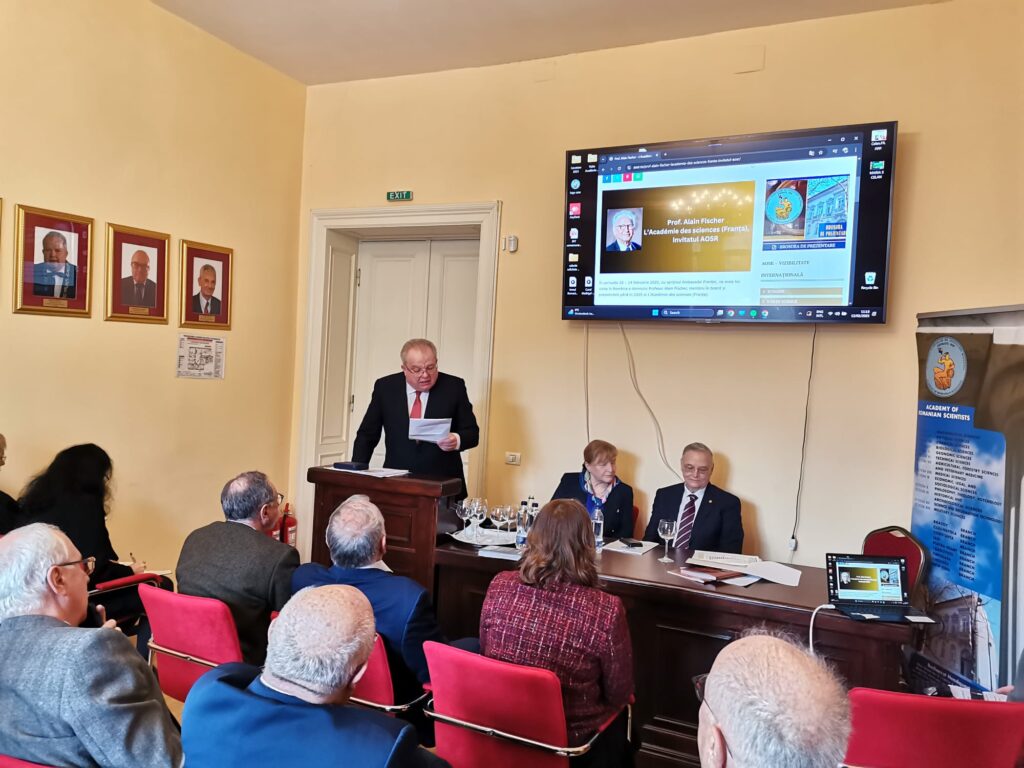
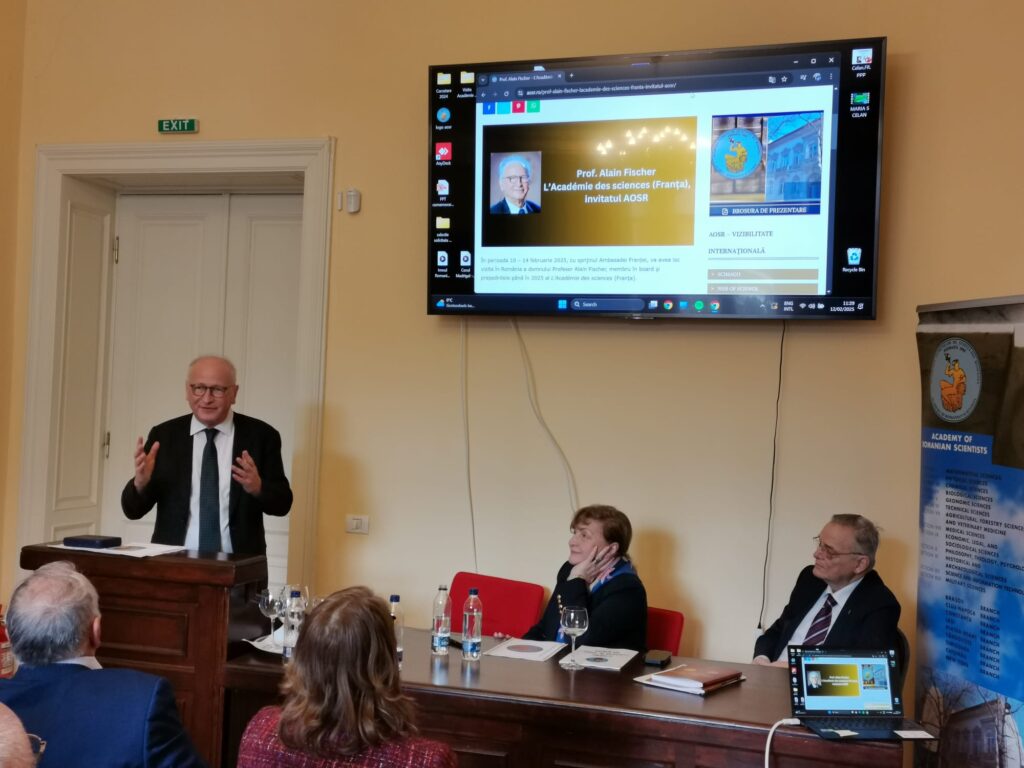
Prof. univ. dr. eng. Dr. Adrian Badea, Honorary President of the Romanian Academy of Scientists, referred to the scientific collaboration on multiple levels between Romania and France and to the prospects that are opening up in the scientific cooperation between the two Academies through large-scale projects on topics of fundamental interest. The presidents of the sections of the AOSR gave a brief presentation of each section of the institution, highlighting the areas and themes that could be the subject of future collaborations. Prof. Alain Fischer introduced L’Académie des sciences and expressed his interest in developing substantial collaboration on common topics of interest in the fields of science between the two Academies.
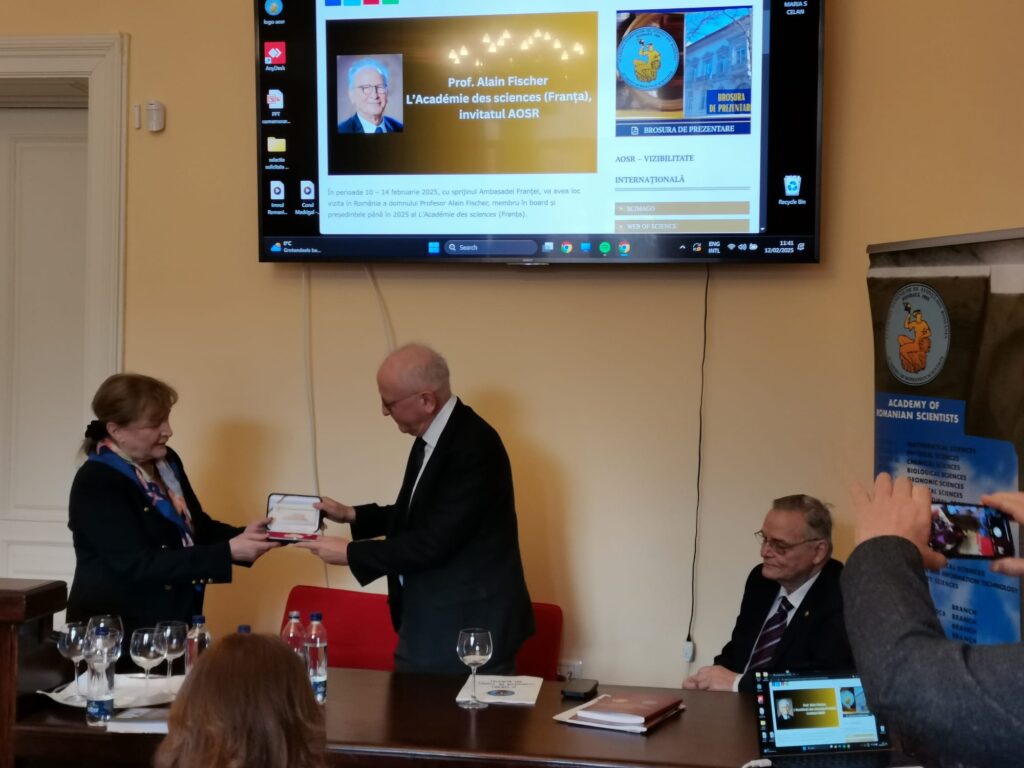
At the end of the meeting, Prof. Univ. dr. dr. eng. Doina Banciu presented Academician Alain Fischer with the medal of the Romanian Academy of Scientists.
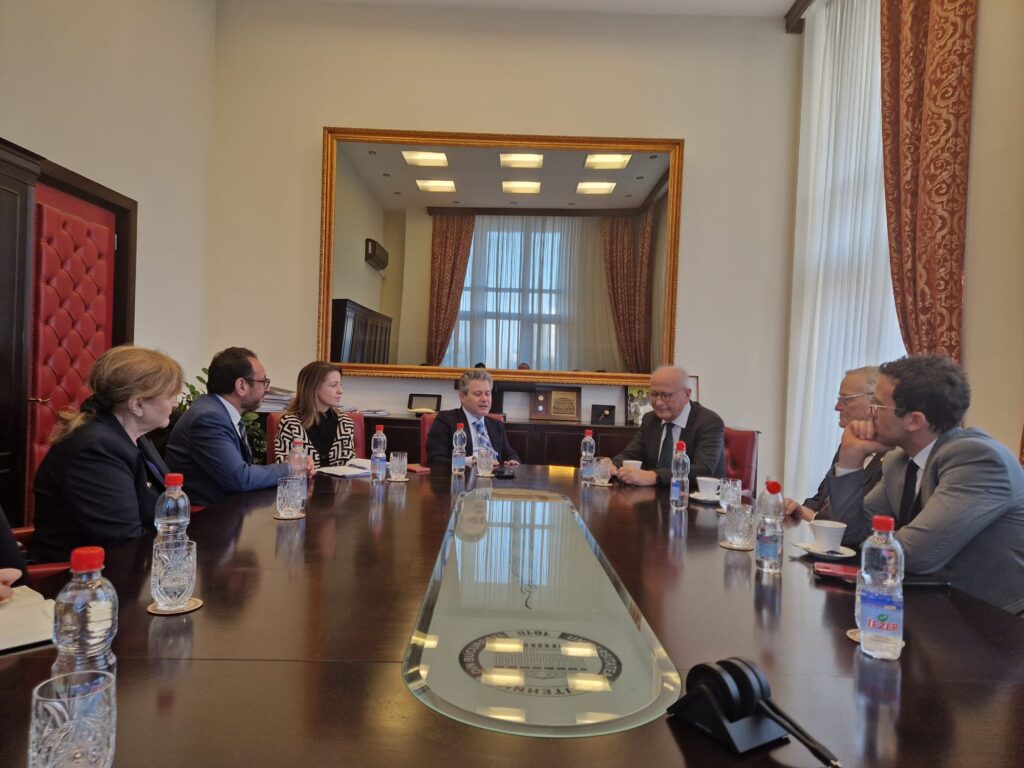
Next, on Wednesday, February 12, 2025, Prof. Fischer visited the National University of Science and Technology Politehnica Bucharest, where he was accompanied by the President Prof. univ. dr. dr. eng. Doina Banciu and by representatives of the French Embassy: Mr. Julien Chiappone-Lucchesi – Chargé de coopération et action culturelle (COCAC) at the French Embassy and Director of the French Institute in Romania, Mr. Rabie Ben Atitallah – Scientific and Academic Attaché, Mrs. Charlotte Souyris – Scientific Cooperation Officer and Mr. Jean-Elie Malkin (international technical expert) – Honorary Advisor at the Ministry of Health. At the Polytechnic University, they visited the research laboratory of the Department of Bioresources and Polymer Science, where Mr. Prof. dr. dr. eng. Horia Iovu, from the Faculty of Applied Chemistry and Materials Science, described and presented the 3D Printing Center. This was followed by a meeting with Mr. Mihnea Costoiu, Rector of the National University of Science and Technology Politehnica Bucharest.
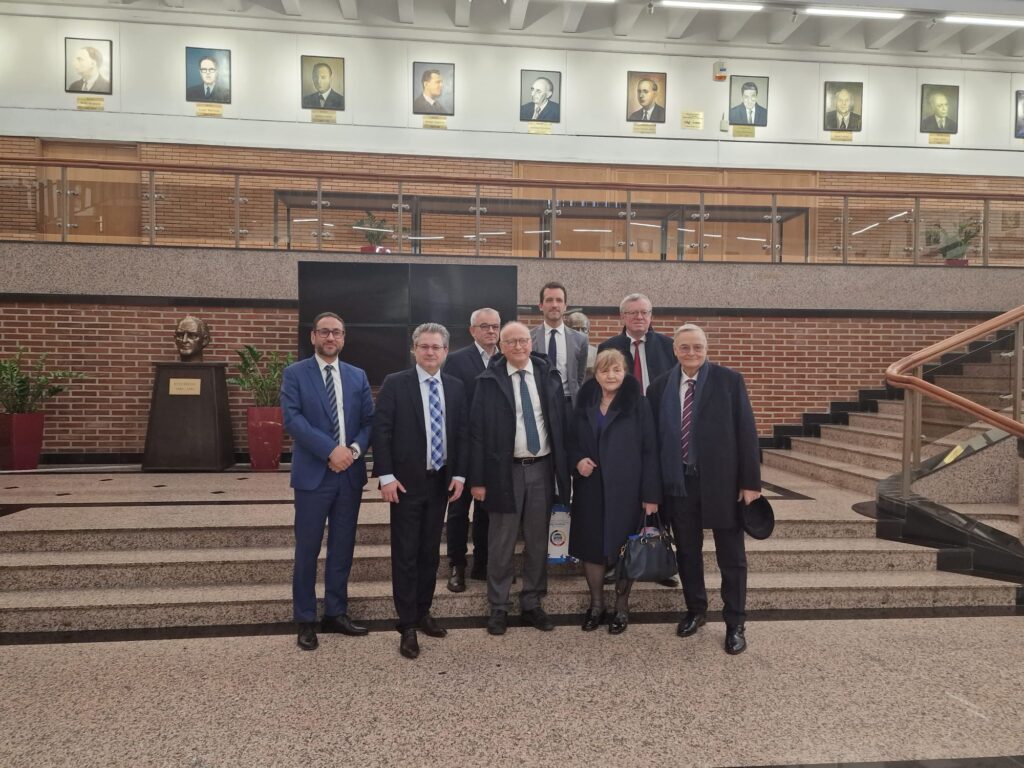
On Thursday, February 13, 2025, took place a visit to the Fundeni Clinical Institute, attended by Professor Alain FischerMrs. Prof. Univ. Dr. Camelia Diaconu, full member of the Medical Section of the AOSR and member of the French National Academy of Medicine, and Mr. Jean-Elie Malkin. Prof. Univ. Dr. Ileana Constantinescu, AOSR Associate Member and Head of the Discipline of Immunology and Transplant Immunology at the University of Medicine and Pharmacy “Carol Davila” Bucharest. Mrs. Constantinescu presented the Immunology Research Laboratory. The program continued with a visit to National Institute of Infectious Diseases “Prof. Dr. Matei Balș” which included a meeting with Mr. Senator Adrian Streinu-Cercel, Prof . Univ. Dr. M.D., PhD, HC, Chair of the Health Commission, visiting some medical wards, together with Dr. Adrian Marinescu, the interim manager of the Institute, and visiting the Pediatric Ward of the Matei Balș Institute.
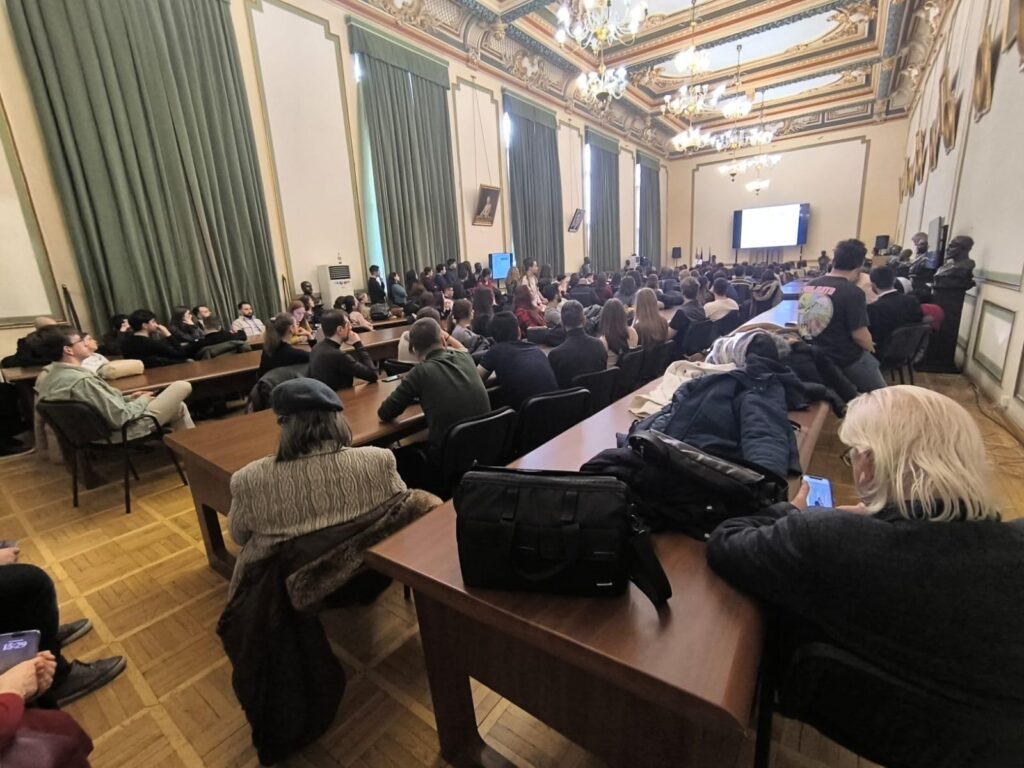
Another item on the agenda for Thursday, February 13, 2025, was the visit of Professor Fischer together with Ms. Prof.univ.dr.ing. Doina Banciu at the University of Medicine and Pharmacy “Carol Davila” in Bucharest. The guest met with representatives of the prestigious University’s management and the Minister of Health, Alexandru Rafila. During his visit, Professor Alain Fischer visited the UMFCD’s 3D Printing and Simulation Center and delivered the “Gene Therapy” lecture in the presence of numerous students, professors and academics. At the end, the Professor received the UMFCD Gold Medal.
The visit to Romania of Professor Alain Fischer, a world-renowned scientific personality, was an elite academic event, which opens important perspectives for collaboration in the field of medical sciences and other leading research fields between L’Académie des Sciences and the Romanian Academy of Scientists.
Communication and Public Relations Office of the Romanian Academy of Scientists
Reception speech Prof. Emil Dinga, Honorary Member of AOSR
Prof. Emil DINGA – Honorary Member, Section of Economic, Juridical and Sociological Sciences – AOSR – will deliver the reception speech “ABOUT A TETRAVALENT LOGIC IN ECONOMICS” on March 12, 2025, at 13:00, at the headquarters of the Academy of Romanian Scientists, “Constantin Angelescu” Hall, 1st floor, 3 Ilfov Street, Sector 5, Bucharest.
Prof. Alain Fischer – L’Académie des sciences (France), AOSR guest
From February 10 to 14, 2025, with the support of the French Embassy, the visit of Professor Alain Fischer, board member and president until 2025 of L’Académie des sciences (France), will take place in Romania.
The Romanian Academy of Scientists has organized the program of the visit over a period of 5 days, one in Cluj-Napoca and 4 in Bucharest. The program of Prof. Alain Fischer will include meetings with AOSR members, visits to the National University of Science and Technology Politehnica Bucharest, the University of Medicine and Pharmacy “Carol Davila” in Bucharest and two prestigious hospitals in Bucharest (University Hospital of Central Military Emergency “Dr. Carol Davila”, Fundeni Clinical Institute).
Prof. Alain Fischer will give a lecture “Gene Therapy” at the University of Medicine and Pharmacy “Carol Davila” in Bucharest.
In Cluj-Napoca, Professor Alain Fischer will meet with the leadership of the AOSR Cluj Branch and representatives of the University of Medicine and Pharmacy “Iuliu Hațieganu” in Cluj-Napoca.
RO-SCUD – AOSR Science-Culture-Diplomacy Program for Romania
Program initiated by the Academy of Romanian Scientists together with the Academy of Economic Studies of Bucharest and the National University of Theatre and Cinematographic Art “I.L. Caragiale” Bucharest
AOSR Science-Culture-Diplomacy Program for Romania
ROmanmanianprogram Science– Culture– Diplomacy(RO-SCUD)
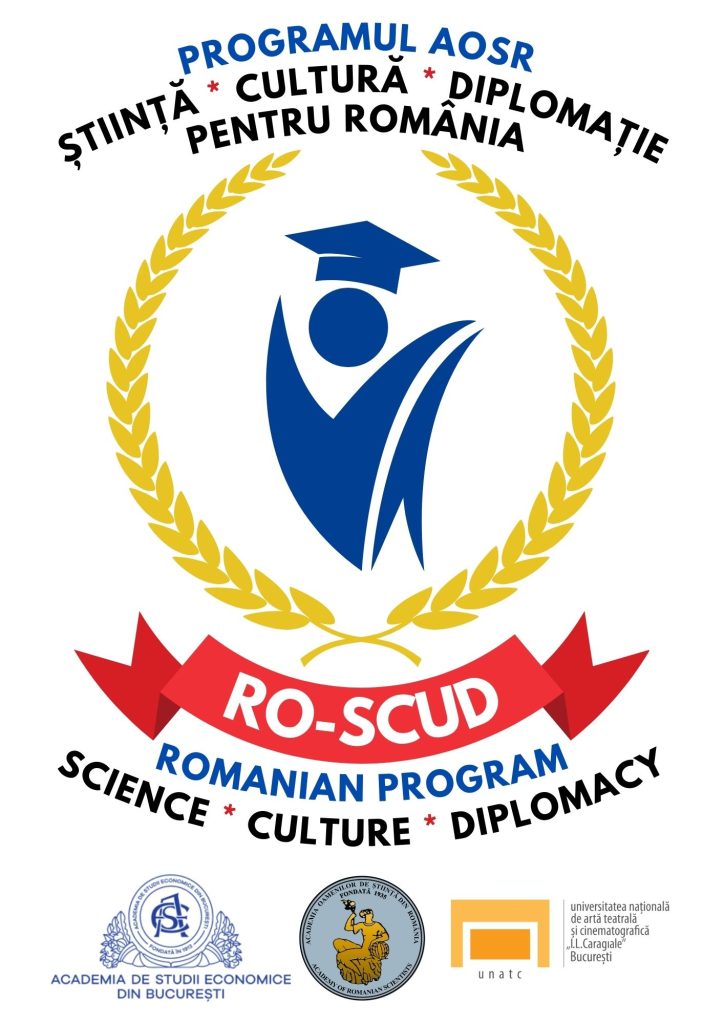
ARGUMENT
The year 2025 may set the stage for profound and complex changes in humanity’s existence, globally, regionally, nationally and, by extension, in the lives of citizens everywhere.
The overlapping of crises – energy crisis, economic crisis, social crisis, institutional crisis, diplomatic crisis – generated by conflicts of all kinds, combined with the digital transformation of society due to the expansion of technology and the new paradigm of politics, from collaborative democracy to democracy of power (identifying and highlighting the influence of national components in global developments), leads to often unpredictable effects, which can in turn generate serious deviations in the existence of mankind.
Identifying and highlighting the influence of national components in global developments is becoming a concern and an obligation for recognizing the status and strength of a nation. They are the national vectors capable professionally, intellectually and in terms of relationships of positioning a nation among those that have a say in the world.
Throughout human history, it has been shown that Science is the main factor driving evolution. The industrial revolutions – from the discovery of the steam engine in the 18th century to Artificial Intelligence in the 21st century – have influenced economic and social development, inter-human relations, institutional relations, inter-state relations.
Culture, in all its forms, has evolved with society and has sought to empower the human spirit and be a basic component in the evolutionary process. Culture, nowadays, associated with various attributes, encompasses the whole socio-economic and political life of a society: musical culture, literary culture, artistic culture, civic culture, economic culture, political culture, diplomatic culture, digital culture, etc.
Diplomacy has also broadened its scope. There is talk of economic diplomacy, political diplomacy, cultural diplomacy (in a fruitful dovetail between diplomacy and culture), cyber diplomacy, but above all alternative diplomacy, which must support traditional diplomatic efforts.
The fundamental pillars of foreign policy will remain the same, but they can be creatively and beneficially complemented with new directions and new partnerships that can be harnessed to the benefit of common interest.
Scientific cooperation, collaboration between educational and cultural institutions, the presence of Romanian elites all over the world have created and can continue to create bridges for significant, sustainable and durable economic development. These are areas where there is the advantage of continuity, tradition and geographical proximity, where projects can be developed with tangible benefits for significant, sustainable and lasting economic growth of the countries. Romania can be an effective pillar both in the Balkans, alongside the other countries in this part of Europe, and in the European and global context.
Science, Culture and Diplomacy (SCUD) can have a determining role in Romania’s positive positioning.
Academies, educational institutions, research and cultural institutions in any country have the vocation to contribute actively to the development of the society in which they exist, each in relation to their specific role and tasks.
In the 21st century, digital communication has intervened in all processes, facilitating cooperation, collaboration, but above all information and knowledge.
SCUD Program – Science-CUlture-Diplomacy
The objectives of the AOSR, as stipulated in the founding law, are “the conception, promotion, development, support and protection of science in all its direct, indirect or adjacent forms, actions and methods”.
In carrying out its tasks, “AOSR collaborates with the academies of the branch, with the Ministry of Education and Research, with academic, research and educational scientific institutions and organizations, in the country and abroad[1]“.
To this end, the AOSR is developing two major programs of national interest: the Digital Transformation in Science and the Romania Knowledge Program, launched in 2024.
In addition to this, the RO-SCUD Program mainly aims to carry out activities to achieve the following objectives:
- to capitalize, in a systemic approach, the results obtained through the scientific actions carried out by the AOSR,
- to disseminate through all means and forms of expression successful initiatives and important achievements,
- to promote the personalities of Romanian scientific and cultural life, regardless of their age,
- initiate and support programs and projects of bilateral, regional, European and global interest,
- to support the objectives of RO-SCUD through bilateral and multi-institutional partnerships at national and international level,
- to bring back and consolidate in the national and international consciousness the authentic Romanian values, which have contributed to the development of science and culture at national and international level.
The implementation of the Program will be done through focus groups such as ”think tank”[2]to which specialists from other research, educational and cultural institutions will be invited. The Program will also involve young researchers whose projects have been funded by the AOSR.
[1] LAW no. 31 of January 15, 2007 (*updated*) on the reorganization and functioning of the Academy of Romanian Scientists, ART. 4: In the performance of its duties, the Romanian Academy of Romanian Scientists recognizes the Romanian Academy as the highest national forum of scientific and cultural consecration and collaborates with the academies of the branch, with the Ministry of Education and Research, with scientific, academic, research and educational institutions and organizations, in the country and abroad.
[2] Think tank
January 24, at the Romanian Academy of Scientists
The Romanian Academy of Scientists celebrates January 24 as a fundamental event in our history and in the country’s evolution, with profound reverberations in the present and in the future, in Romania’s European development.
The union of the two Romanian countries into a single state, the United Romanian Principalities, was an event of major importance in the building of Modern Romania, a European state by origins and history, vocation, aspirations and sense of evolution, and in the process of building Greater Romania. The reforms during the reign of Prince Alexandru Ioan Cuza contributed to the modernization of the Romanian status, in the direction of its European development . Education, science and culture played a decisive role in this process, helping to emancipate the people and advance the country.
The Romanian Academy of Scientists expresses its gratitude for the contribution of its forefathers to the realization of the Unification of the Principalities and to the process of building European Romania and pays homage to this work with deep and complex significance in the development and evolution of the country. Within this framework, the AOSR emphasizes the fundamental role of education, science and research in the process of development of the country through knowledge, a process that must generate a national academic synergy.
January 24, 2025 is marked by the Academy of Romanian Scientists through a series of scientific events dedicated to the Union of the Principalities. On January 21, the Conference “The Union of the Romanian Principalities on January 24, 1859″, organized by the Historical and Archaeological Sciences Section of the AOSR, was held. On 25 January 2025, in the organization of the Constanta Branch of AOSR, will be held the Lecture “The Statesmen of 1859 – reforming patriots towards the legislative and institutional Europeanization of the Modern Romanian State”.
On the 166th anniversary of the Union, Prof. univ. dr. eng. Doina Banciu, President of the Romanian Academy of Scientists, said: “The Union of the Principalities remains a high example of vision and national consciousness and, at the same time, a prestigious landmark in the process of Romania’s European development and evolution. Romania’s elites, educated at Europe’s great universities, who brought the European spirit and ideals to Romania and were directly involved at all levels in making them a reality, have had an exceptional merit in this far-reaching and complex process. Education, science and culture have made a fundamental contribution to the process of enlightening the people and the country’s development. We would like Romanian elites to continue to unite in a national effort that will carry forward the process of development of European Romania. For our Academy, Knowledge remains a fundamental vector of progress and sustainable development, a vision that we are developing through the Romania Knowledge Program.”
Communication and Public Relations Office of the Romanian Academy of Scientists
Bucharest, 24.01.2025
Professor Dr. Nicolae Constantinescu (1936-2025) has left us
The AOSR Medical Section is sad and sheds a tear at the catafalque of a great Romanian, Professor Dr. N. Constantinescu.
As a member of the AOSR and at the same time of the Academy of Medical Sciences, the two sisters founded by the same father, Professor Dr. C. Angelescu, it is up to us, our colleagues, to set up an infusion for posterity and to make the veins of future generations, of today’s youth, to flow drops of “PERFUTIONS CONTA FORGETTING”. Generations of physicians know Professor Nae Constantinescu as the author of treatises on Surgical Anatomy, or in a broader sense Clinical Anatomy, because we have sacralized the idea that “Anatomie fundamentum medicinnae est”, and he has worked all his life, even in the present-recent era, on a monumental treatise on this miracle of divine creation, the human body, seen through the eyes of surgeons, of clinicians.
He fought for the introduction of the subject of Clinical Anatomy in medical faculties. At the same time he was a surgeon by vocation, most Romanians know him for his image as an operator at Colțea, where he worked since the 1980s and where they found him on duty, tirelessly, for nights in a row in 1989, saving the shot or wounded of the revolution.
At Colțea, the oldest Romanian hospital (320 years old), in University Square, dozens of wounded were hospitalized and the first sacrifices of innocent young people were made. It was precisely here at Colțea, in Surgery, where Romanian surgery was born through its fathers and its choirmasters, N.Kretulescu, N.Turnescu, Severeanu, Toma Ionescu, N. Hortolomei (almost all of them were called Nicolae, like him), N. Constantinescu was a good Romanian and a faithful man, as if by heavenly providence, his doctoral thesis entitled “On the biology of rib transplantation”, the surgical harvesting of a rib being the only surgical intervention divinely performed, at creation, Professor Constantinescu’s surgical work includes over 8000 interventions, and his scientific work is extremely rich, addressing modern topics, among which I would mention one of world renown: “Demonstration of the aqngiogenic capacity of stem cells from the adult red bone marrow” (paper presented at the World Congress of Cytochemistry and Histochemistry in 1976, appreciated in Paris by Prof. Duhamel, in Munich by Prof. Begemann, in the USA by W.Blount and H. Boyd.
In 1999 I had the opportunity to see him honored by the great luminaries of the medical world in California and around the world, including G. Emil Palade, in Los Angeles, where, as a man of the city, he also held the position of Consul of Romania in the western USA. But together with 6 Nobel Prize laureates at the same meeting, he was appreciated, of course, not as a politician or Consul, but as a great researcher of the cellular world. Medical students love his anatomy with its clinical and surgical valences, bequeathed by him, we surgeons consider him a heritage asset, the eminesciologists are happy for what he wrote about the sufferings of Eminesci, our academy cherishes him as one of its luminous figures, UMF Carol Davila loves him for the tenacity with which he still worked in Anatomy at over 85 years of age to finish his great treatise on Clinical Anatomy.
You know that we all loved you and will never forget you.
Lord, protect the Romanians!
21.01.2025
Prof. V. SÂRBU, President of the Medical Section of AOSR


